Sunday's general election results in Spain have created uncertainty with regards to the future of the next government - causing a possible deadlock.
Follow all our latest updates here on this hot July election.

 ${title}
${title}
Live ended
Summary
- Spain's Conservative People's Party wins election but does not secure enough votes to command a majority.
- Early polls suggested the Conservative People's Party would win with the support of the right-wing Vox Party.
- Turnout is up on the last general election despite Spain enduring an extreme heatwave.
- Polls closed at 2000CET in Spain's general election.
- Prime Minister Pedro Sánchez called the early election after his Spanish Socialist Workers Party and its far-left partner, Unidas Podemos, were defeated in local and regional elections in May. Sánchez has been premier since 2018.
Election results
The right-wing bloc only managed to secure 169 seats, with the left-wing winning 153 seats. In turn, both parties have fallen short of forming an absolute majority - given the threshold for forming an absolute majority sits at 176 seats. The election results have created uncertainty with regards to the future of the next government - causing a possible deadlock.


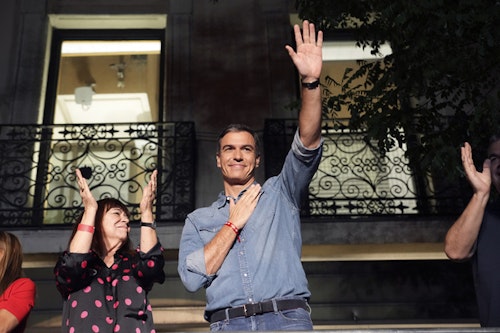
Socialist Workers' Party leader and current Prime Minster Pedro Sanchez greets supporters outside the party's headquarters in Madrid, Spain. Spain's conservative Popular Party is set to narrowly win the country's national election but without the majority needed to topple the coalition government of Socialist Prime Minister Pedro Sánchez.
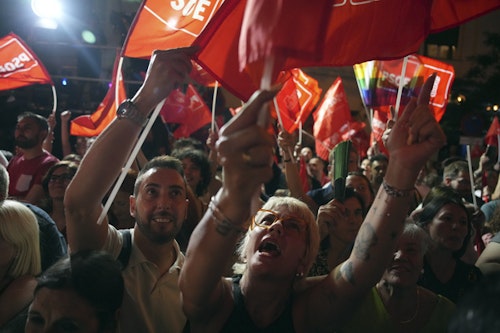
Socialist Workers' Party supporters cheer as they wait for Prime Minister and Socialist party leader Pedro Sanchez outside the party's headquarters in Madrid.
Provisional results at 22:55 CET according to Spain's Interior Ministry.
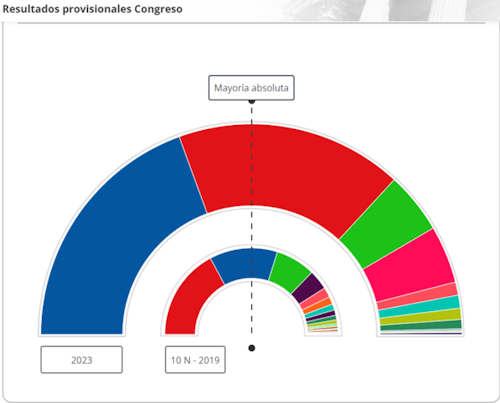
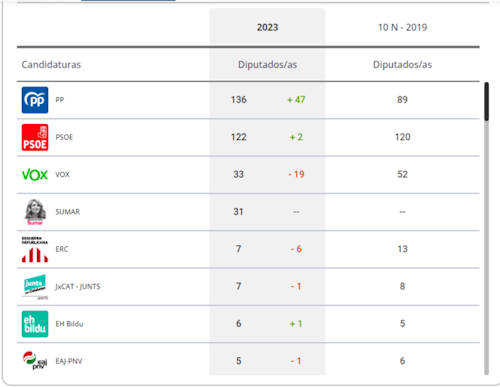
85% of votes counted
The left is making gains, as 85% of votes have been counted in Spain's general election. The combined votes for the left bloc amount to 173 seats, whilst the PP and Vox parties have won 169 seats.
The conservative PP party has been expected to form a coalition with far-right Vox party, if it falls short of the majority necessary to form a government. However, Vox has not performed as well as it did in the 2019 elections.
Despite these developments, the race still remains tight.
The leader of the conservative Populist Party Alberto Núñez Feijóo took to the stage last Thursday with a campaign sign behind him which read: "This is the moment.”
But who exactly is the man who could become Spain's new PM? Find out here.
🇪🇸 With more than half of the vote counted, the conservative Popular Party and the Socialist Party are competing for first place.
Follow the latest updates on the #SpanishElection 👇
— euronews (@euronews) July 23, 2023
According to Spanish channel TVE, the Socialist Party of Catalonia is forecast to win approximately 19 seats (up from 12 seats in 2019) in Catalonia.
This would see The Socialist Party of Catalonia gain the most votes in the region - in turn ousting pro-independence forces.

Uncertainty despite 60% of votes counted
Although close to 60% of votes have now been counted, the outcome of the election still remains uncertain. However, the conservatives are still expected to win the election.
Currently the Populist Party has garnered 131 seats, the Socialist Workers' Party 128 seats, the far-right Vox party 33 seats and the left-wing Sumar party 30 seats.
Spain's Interior Ministry has forecast electoral turnout at 69,09% - 2,86% higher than turnout in Spain's 2019 elections which reached 66,23%.
Vox party responds to exit polls
Ignacio Garriga, the Vox party's Secretary General declared "we are very satisfied with the electoral campaign that VOX has carried out. All this, despite the difficulties, the violent attacks and the media manipulation that we have suffered."
"Whatever the result, we are going to continue working."
‼ DIRECTO | @Igarrigavaz
"Estamos muy satisfechos con la campaña electoral que ha realizado VOX. Todo ello, a pesar de las dificultades, los ataques violentos y la manipulación mediática que hemos sufrido".
"Sea cual sea el resultado, nosotros vamos a seguir trabajando". pic.twitter.com/bWVv6xRYgn
— VOX 🇪🇸 (@vox_es) July 23, 2023
Vox began barring certain media outlets from its headquarters and its events during the previous parliamentary elections in 2019. Since then, it has not only maintained - but also extended these vetoes.
Miguel González, a veteran reporter for El País newspaper told media watchdog Reporter Sans Frontieres “as we’re not accredited, we cannot access the press areas to work and take good photos.”
“Their spokespersons don't answer any questions, and when they do, it’s often to insult us.”
Following exit poll results, Cuma Gamarra, Secretary General of Spain's conservative Populist Party declared "this is going to be a great electoral day because the PP is going to recover the position of first political force in a general election."
"The last time this happened was in 2015. In addition, our candidate, Alberto Núñez Feijóo, is the only one that appears in all the constituencies that have improved results."
🔵 A los españoles se nos ha consultado quién queremos que sea nuestro próximo presidente y la respuesta mayoritaria ha sido @NunezFeijoo.
🔴 Es la primera vez en 27 años que un presidente del Gobierno que se presenta a la reelección pierde las elecciones. pic.twitter.com/lRYtsKUmat
— Partido Popular (@ppopular) July 23, 2023
The PP's tweet states: "🔵 We Spaniards have been asked who we want to be our next president and the majority answer has been
@NunezFeijoo.
It is the first time in 27 years that a Prime Minister running for re-election has lost the elections.”
🇪🇸 A poll by Sigma Dos RTVE, Spanish TV channel estimates Spain's conservative People's Party will win between 145 and 150 seats. This would allow the party to obtain a very tight absolute majority with the far-right Vox party. #SpanishElection #23J #EleccionesGenerales2023 👇
— euronews (@euronews) July 23, 2023
Today's snap election was called by Prime Minister Sanchez two months ago. The decision followed the sucess of the conservatives in local and regional elections which took place in May.
Although the decision caught many Spaniards by surprise, this strategy is not new. Back in 2019 Sanchez - who had only been governing for a few months - called for a general election which proved successful.
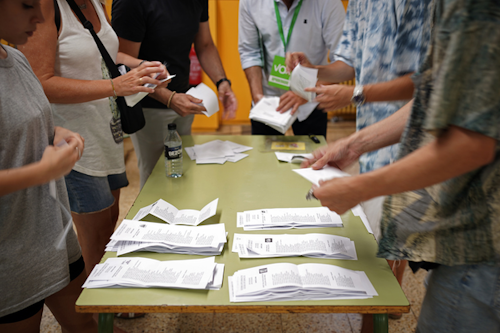
Spain's conservative People's Party has been forecast to gain 34.2% of votes - the highest percentage of the voteshare.
Falling short of a majority, many believe the party will form a coalition with Spain's far-right Vox party. However, party leader Alberto Núñez Feijóo has kept his coalition intention vagues. Describing the PP as "a centre-right reformist party", he admitted on Friday that a coalition government with Vox "is not ideal".
A shift from 2019 election results
According to surveys, Spain's far-right party Vox is set to lose up to half of the votes it gained in the 2019 elections. Four years ago, Spain's Vox party made big gains, winning 52 seats.
Pedro Sanchez's party came out on top in 2019 - winning the 120 seats - the highest number.
Spain's EU Council presidency
Spain took over the six-month rotating presidency of the EU Council back in July. Prime Minister Pedro Sánchez had hoped to use to showcase advances made by his government. An election defeat for Sánchez could see the PP taking over the EU presidency reins.
Despite the uncertainty created by the snap general, Spanish officials insist the presidency will not be disrupted and run as planned.
Three other exit polls carried out over the last few days concluded that the PP would take the win - but without an absolute majority. Their publication was however banned according to AFP.
👉 A reminder that a party needs an absolute majority of 176 seats in Spain’s 350-seat congress to take power. #23J #EleccionesGenerales2023
— euronews (@euronews) July 23, 2023
Exit polls: PP party forecast to gain the most votes
A poll by Sigma Dos RTVE, Spanish TV channel estimates Spain's conservative People's Party will win between 145 and 150 seats. This would make the PP the party with the most votes - at 34.2%, alllowing the party to obtain a very tight absolute majority with the far-right Vox party.
In second position, Prime Minister Pedro Sanchez's Spanish Socialist Workers' Party has been forecast to garner 28.9% of votes, obtaining between 113-118 seats.
Exit polls put the Sumar party in third position, predicting it will obtain 13.3% of the vote and an estimate of 28-31 deputies in Congress.
A reminder that a party needs an absolute majority of 176 seats in Spain’s 350-seat congress to take power.
Polling stations across Spain have now closed at 20:00 CET - they have been open since 7:00 CET.
¡Llegó la hora!
Todo al verde 💪🇪🇸 https://t.co/kcdxNvjopN
— VOX 🇪🇸 (@vox_es) July 23, 2023
With polls predicting victory for the right-wing Popular Party, a future national government that includes Santiago Abascal's Vox party is more than likely. Its growth is the result of several factors, and can be traced back to the push for Catalan independence in 2017.
Spain's 37 million eligible voters have been tasked with electing 350 members to the lower house of Parliament, the Congress of Deputies, and 208 members to the Senate. Nearly 2.5 million people have already cast their postal vote.
High stakes for Europe
The stakes are high for Spain, as the country could become the latest European Union member to swing to the populist right.
If a shift occurs, it would represent a major upheaval after five years of a left-wing government under socialist Prime Minister Pedro Sanchez.
A railway breakdown on the Madrid-Valencia line broke the electoral calm as more than 5,000 people (some of whom were travelling to vote) heated up the mood.
The services were suspended on Sunday morning due to an incident in the San Isidro tunnel.
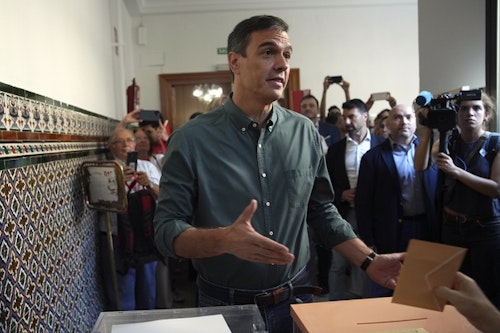
Misleading voting claims spread on social media
With many people currently enjoying their summer holidays, social media users have been falsely claiming that it’s impossible to vote if you’re away. The allegations, amplified by supporters of the center-right Popular Party and the far-right Vox Party, bear similarities to the baseless claims spread by then-President Donald Trump ahead of his 2020 US election defeat.
Hardly any economic proposals have been discussed during the campaign, but there is widespread agreement that if there is a change of government it will be reflected in the economy.
The future government will face the challenge of reducing Spanish debt, which stands at just over 112% of GDP, and a deficit of 4.8%.
Turnout was at 53.12% compared to 56.85% during the last elections in 2019. Many are thought to have voted early due to the heatwve that Spain is currently experiencing.
Most opinion polls for today's vote have put the right-wing Popular Party, which won the May vote, ahead of the Socialists but they will most likely need the support of the extreme right Vox party if they want to form a government.
Prime Minister Pedro Sánchez called the early election after his Spanish Socialist Workers Party and its far-left partner, Unidas Podemos, took a severe beating in local and regional elections in May. Sánchez has been premier since 2018.
There is now less than an hour before polls close and an exit poll will give us a good indication of which of the parties have performed the best.
Polling began Sunday in Spain in a general election that could make the country the latest European Union member to swing to the political right.












